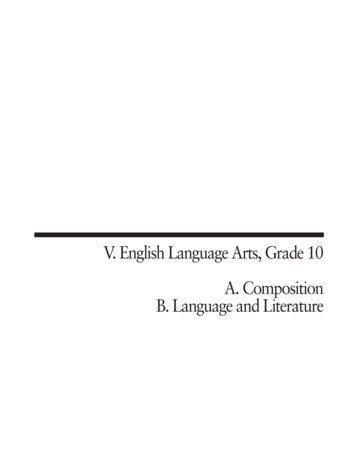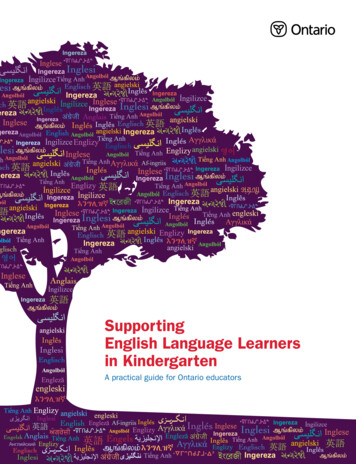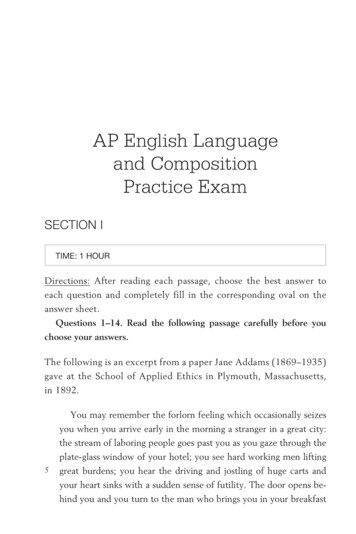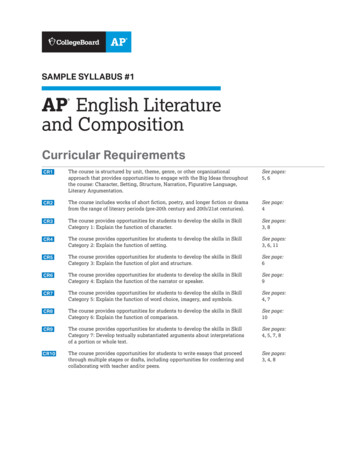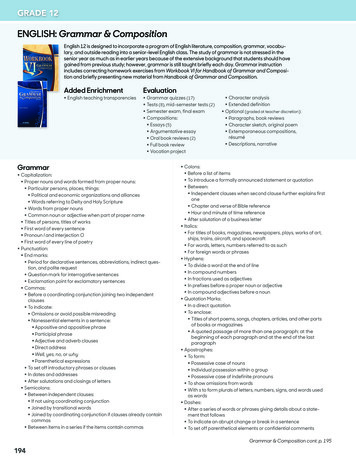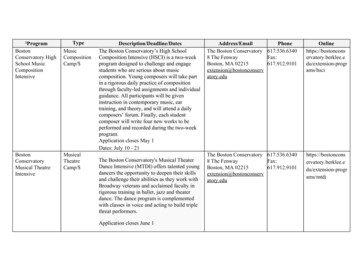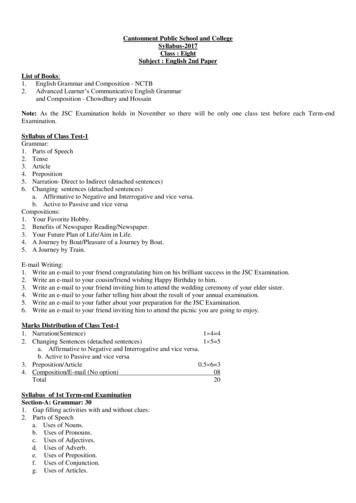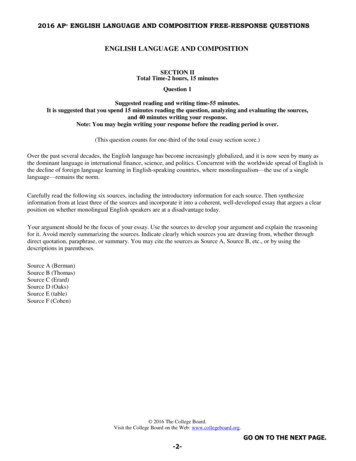
Transcription
2016 AP ENGLISH LANGUAGE AND COMPOSITION FREE-RESPONSE QUESTIONSENGLISH LANGUAGE AND COMPOSITIONSECTION IITotal Time-2 hours, 15 minutesQuestion 1Suggested reading and writing time-55 minutes.It is suggested that you spend 15 minutes reading the question, analyzing and evaluating the sources,and 40 minutes writing your response.Note: You may begin writing your response before the reading period is over.(This question counts for one-third of the total essay section score.)Over the past several decades, the English language has become increasingly globalized, and it is now seen by many asthe dominant language in international finance, science, and politics. Concurrent with the worldwide spread of English isthe decline of foreign language learning in English-speaking countries, where monolingualism—the use of a singlelanguage—remains the norm.Carefully read the following six sources, including the introductory information for each source. Then synthesizeinformation from at least three of the sources and incorporate it into a coherent, well-developed essay that argues a clearposition on whether monolingual English speakers are at a disadvantage today.Your argument should be the focus of your essay. Use the sources to develop your argument and explain the reasoningfor it. Avoid merely summarizing the sources. Indicate clearly which sources you are drawing from, whether throughdirect quotation, paraphrase, or summary. You may cite the sources as Source A, Source B, etc., or by using thedescriptions in parentheses.Source A (Berman)Source B (Thomas)Source C (Erard)Source D (Oaks)Source E (table)Source F (Cohen) 2016 The College Board.Visit the College Board on the Web: www.collegeboard.org.GO ON TO THE NEXT PAGE.-2-
2016 AP ENGLISH LANGUAGE AND COMPOSITION FREE-RESPONSE QUESTIONSSource ABerman, Russell A. “Foreign Language for ForeignPolicy?” Inside Higher Ed. Inside Higher Ed,23 Nov. 2010. Web. 8 May 2013.The following is excerpted from an article on a Web site devoted to higher education.These are troubled times for language programs in the United States, which have been battered by irresponsiblecutbacks at all levels. Despite the chatter about globalization and multilateralism that has dominated public discoursein recent years, leaders in government and policy circles continue to live in a bubble of their own making, imaginingthat we can be global while refusing to learn the languages or learn about the cultures of the rest of the world. So itwas surely encouraging that Richard Haass, president of the Council on Foreign Relations and a fixture of theforeign policy establishment, agreed to deliver the keynote address at the American Council on the Teaching ofForeign Languages Annual Convention in Boston on November 19.Haass is a distinguished author, Oberlin- and Oxford-educated, and an influential voice in American debates. Thegood news is that in his talk, “Language as a Gateway to Global Communities,” Haass expressed strong support forincreased foreign language learning opportunities. He recognized the important work that language instructorsundertake as well as the crucial connection between language and culture: language learning is not just technicalmastery of grammar but rather, in his words, a “gateway” to a thorough understanding of other societies. . . .Haass claims that in an era of tight budgets, we need convincing arguments to rally support for languages. Of coursethat’s true, but—and this is the bad news—despite his support for language as a gateway to other cultures, hecountenances only a narrowly instrumental defense for foreign language learning, limited to two rationales: nationalsecurity and global economy. At the risk of schematizing his account too severely, this means: more Arabic fornational security and more Mandarin, Hindi, and, en passant, Korean for the economy. It appears that in his view theonly compelling arguments for language-learning involve equipping individual Americans to be better vehicles ofnational interest as defined by Washington. In fact, at a revealing moment in the talk, Haass boiled his own positiondown to a neat choice: Fallujah or Firenze. We need more Arabic to do better in Fallujah, i.e., so we could have beenmore effective in the Iraq War (or could be in the next one?), and we need less Italian because Italy (to his mind) is aplace that is only about culture.In this argument, Italian—like other European languages—is a luxury. There was no mention of French as a globallanguage, with its crucial presence in Africa and North America. Haass even seems to regard Spanish as just onemore European language, except perhaps that it might be useful to manage instability in Mexico. Such argumentsthat reduce language learning to foreign policy objectives get too simple too quickly. And they run the risk ofdestroying the same foreign language learning agenda they claim to defend. Language learning in Haass’s viewultimately becomes just a boot camp for our students to be better soldiers, more efficient in carrying out the projectsof the foreign policy establishment. That program stands in stark contrast to a vision of language learning as part ofan education of citizens who can think for themselves.Haass’s account deserves attention: he is influential and thoughtful, and he is by no means alone in reducing therationale for foreign language learning solely to national foreign policy needs. . . .Yet even on his own instrumentalterms, Haass seemed to get it wrong. If language learning were primarily about plugging into large economies moresuccessfully, then we should be offering more Japanese and German (still two very big economies after all), but theybarely showed up on his map. 2016 The College Board.Visit the College Board on the Web: www.collegeboard.org.GO ON TO THE NEXT PAGE.-3-
2016 AP ENGLISH LANGUAGE AND COMPOSITION FREE-RESPONSE QUESTIONSThe much more important issue involves getting beyond instrumental thinking altogether, at least in the educationalsphere. Second language acquisition is a key component of education because it builds student ability in language assuch. Students who do well in a second language do better in their first language. With the core language skills—abilities to speak and to listen, to read and to write—come higher-order capacities: to interpret and understand, torecognize cultural difference, and, yes, to appreciate traditions, including one’s own. Language learning is not justan instrumental skill, any more than one’s writing ability is merely about learning to type on a keyboard. On thecontrary, through language we become better thinkers, and that’s what education is about, at least outsideWashington. 2016 The College Board.Visit the College Board on the Web: www.collegeboard.org.GO ON TO THE NEXT PAGE.-4-
2016 AP ENGLISH LANGUAGE AND COMPOSITION FREE-RESPONSE QUESTIONSSource BThomas, David. “Why Do the English Need to Speak aForeign Language When Foreigners All SpeakEnglish?” MailOnline [UK]. AssociatedNewspapers Ltd, 23 Jan. 2012. Web. 8 May 2013.The following is excerpted from an online article in a British newspaper.Department for Education figures show that fewer and fewer of us are learning a foreign language, while more andmore foreigners are becoming multi-lingual. This, say distraught commentators, will condemn us pathetic LittleEnglanders to a life of dismal isolation while our educated, sophisticated, Euro-competitors chat away to foreigncustomers and steal all our business as a result.In fact, I think those pupils who don’t learn other languages are making an entirely sensible decision. Learningforeign languages is a pleasant form of intellectual self-improvement: a genteel indulgence like learning toembroider or play the violin. A bit of French or Spanish comes in handy on holiday if you’re the sort of person wholikes to reassure the natives that you’re more sophisticated than the rest of the tourist herd. But there’s absolutely noneed to learn any one particular language unless you’ve got a specific professional use for it.Consider the maths. There are roughly 6,900 living languages in the world. Europe alone has 234 languages spokenon a daily basis. So even if I was fluent in all the languages I’ve ever even begun to tackle, I’d only be able to speakto a minority of my fellow-Europeans in their mother tongues. And that’s before I’d so much as set foot in theMiddle East, Africa and Asia.The planet’s most common first language is Mandarin Chinese, which has around 850 million speakers. Clearly,anyone seeking to do business in the massive Chinese market would do well to brush up on their Mandarin, althoughthey might need a bit of help with those hundreds of millions of Chinese whose preferred dialect is Cantonese.The only problem is that Mandarin is not spoken by anyone who is not Chinese, so it’s not much use in that equallysignificant 21st century powerhouse, India. Nor does learning one of the many languages used on the sub-Continenthelp one communicate with Arab or Turkish or Swahili-speakers.There is, however, one language that does perform the magic trick of uniting the entire globe. If you ever go,as I have done, to one of the horrendous international junkets which film studios hold to promote their latestblockbusters, you’ll encounter a single extraordinary language that, say, the Brazilian, Swedish, Japanese andItalian reporters use both to chat with one another and question the American stars.This is the language of science, commerce, global politics, aviation, popular music and, above all, the internet. It’sthe language that 85 per cent of all Europeans learn as their second language; the language that has become thedefault tongue of the EU; the language that President Sarkozy of France uses with Chancellor Merkel of Germanywhen plotting how to stitch up the British.This magical language is English. It unites the whole world in the way no other language can. It’s arguably the majorreason why our little island has such a disproportionately massive influence on global culture: from Shakespeare toHarry Potter, from James Bond to the Beatles.All those foreigners who are so admirably learning another language are learning the one we already know. So ourschool pupils don’t need to learn any foreign tongues. They might, of course, do well to become much, much betterat speaking, writing, spelling and generally using English correctly. But that’s another argument altogether.Daily Mail. 2016 The College Board.Visit the College Board on the Web: www.collegeboard.org.GO ON TO THE NEXT PAGE.-5-
2016 AP ENGLISH LANGUAGE AND COMPOSITION FREE-RESPONSE QUESTIONSSource CErard, Michael. "Are We Really Monolingual?"New York Times. New York Times, 14 Jan. 2012.Web. 8 May 2013.The widespread assumption is that few Americans speak more than one language, compared with citizens of othernations — and that we have little interest in learning to speak another. But is this true?Since 1980, the United States Census Bureau has asked: “Does this person speak a language other than English athome? What is this language? How well does this person speak English?” The bureau reports that as of 2009, about20 percent of Americans speak a language other than English at home. This figure is often taken to indicate thenumber of bilingual speakers in the United States.But a moment’s reflection reveals that the bureau’s question about what you speak at home is not equivalent toasking whether you speak more than one language. I have some proficiency in Spanish and was fluent in Mandarin20 years ago. But when the American Community Survey (an ongoing survey from the Census Bureau) arrived in mymailbox last month, posing that question, I had to answer no, because we speak only English in my home.I know I’m not alone. There are countless Americans who speak languages other than English outside their homes:not just those of us who have learned other languages in school or through living abroad, but also employers whohave learned enough Spanish to speak to their employees; workers in hospitals, clinics, courts and retail stores whohave picked up parts of another language to make their jobs easier; soldiers back from Iraq or Afghanistan with somecompetency in Arabic, Pashto or Dari; third-generation kids studying their heritage language in informal schools onweekends; spouses and partners picking up the language of a loved one’s family; enthusiasts learning languages withcomputer software like Rosetta Stone. None of the above are identified as bilingual by the Census Bureau’s question.Every census in the United States since 1890 (except for one, in 1950) has asked about language characteristics, andits question has always seemed to assume that English is the only language relevant for the aspects of life that takeplace outside the home. This assumption, though outdated, is somewhat understandable. After all, the bureau’sprimary goal in asking this question is not to paint a full and complete portrait of the language proficiencies ofAmericans but rather to track immigrants’ integration into mainstream American society and to ascertain whatservices they need, and in what languages. (In October, for instance, the Census Bureau released a list of jurisdictionswith large numbers of voters who need voting instructions translated in a language other than English.)Nonetheless, to better map American language abilities, the census should ask the same question that the EuropeanCommission asked in its survey in 2006: Can you have a conversation in a language besides your mother tongue?(The answer, incidentally, dented Europe’s reputation as highly multilingual: only 56 percent of the respondents,who tended to be younger and more educated, said they could.) Until the census question is refined, claims aboutAmerican monolingualism will almost certainly be overstated.(c) 2016 The College Board.Visit the College Board on the Web: www.collegeboard.org.GO ON TO THE NEXT PAGE.-6-
2016 AP ENGLISH LANGUAGE AND COMPOSITION FREE-RESPONSE QUESTIONSSource DOaks, Ursula. “Foreign-Language Learning: Whatthe United States Is Missing Out On.”Blog.NAFSA.org. NAFSA: Association ofInternational Educators, 20 April 2010.Web. 8 May 2013.The following is excerpted from a Weblog maintained by NAFSA, a leading professional association based in theUnited States and dedicated to international education.It seemed a notably strange coincidence that the day after the Chronicle of Higher Education’s fascinating articleabout foreign-language acquisition and its remarkable contributions to the human mind and to society, Inside HigherEd reported that George Washington University’s arts and sciences faculty had voted by an “overwhelming” marginnot only to remove its foreign languages and cultures course requirement, but also to set up the new requirements insuch a way that introductory foreign language courses can no longer count toward fulfilling any degree requirementin the college. At the same time, GW’s curricular reform is apparently “designed to promote student learning inareas such as global perspectives and oral communications.”One wonders how “global perspectives” can happen without foreign language. But Catherine Porter (a formerpresident of the Modern Language Association), writing in the Chronicle, puts it rather more bluntly. The lack offoreign-language learning in our society, she states, is “a devastating waste of potential.” Students who learnlanguages at an early age “consistently display enhanced cognitive abilities relative to their monolingual peers.” Thisisn’t about being able to impress their parents’ friends by piping up in Chinese at the dinner table—the research isshowing that these kids can think better. Porter writes: “Demands that the language-learning process makes on thebrain . . . make the brain more flexible and incite it to discover new patterns—and thus to create and maintain morecircuits.”But there’s so much more. Porter points out, as many others have, that in diplomatic, military, professional andcommercial contexts, being monolingual is a significant handicap. In short, making the United States a moremultilingual society would carry with it untold benefits: we would be more effective in global affairs, morecomfortable in multicultural environments, and more nimble-minded and productive in daily life.One of Porter’s most interesting observations, to me, was about how multilingualism enhances “brain fitness.” Myown journey in languages is something for which I cannot claim any real foresight or deliberate intention, but by theage of 16, I spoke English, Hungarian, and French fluently. I’ve managed, through travel and personal and familyconnections, to maintain all three. One thing I know for sure is that when I get on the phone with my mother and talkto her in Hungarian for 20 minutes, or if I have to type out an email to a friend in Paris, afterwards I feel like I’vehad a mental jog on the treadmill: strangely energized, brain-stretched, more ready for any challenge, whether it’scooking a new dish or drafting an op-ed. And the connective cultural tissue created by deep immersion in anotherlanguage cannot be overstated. When I went to Hungary during grad school to research my thesis, I figured: noproblem, it’s my native tongue. Yes, but I first learned it when I was a toddler, and never since then. The amount ofpreparation I had to do to be sure I didn’t miss nuance or cultural cues and didn’t draw conclusions based onerroneous translation, was significant, but well worth it. Time and again, I’ve realized how language can transformour interactions with one another. Porter’s article is a wake-up call that neglecting foreign-language learning ishurting our country in more ways than we realize.Used with permission of NAFSA: Association of International Educators. 2016 The College Board.Visit the College Board on the Web: www.collegeboard.org.GO ON TO THE NEXT PAGE.-7-
2016 AP ENGLISH LANGUAGE AND COMPOSITION FREE-RESPONSE QUESTIONSSource E“Population 5 Years and Older Who Spoke a LanguageOther Than English at Home by Language Groupand English-Speaking Ability: 2007.” Table in“Language Use in the United States: 2007.”United States Census Bureau. United StatesCensus Bureau, April 2010. Web. 8 May 2013.The following is adapted from a table in a report from the 2007 American Community Survey (United States CensusBureau) on language use in the United States.Population 5 Years and Older Who Spoke a Language Other Than English at Home by LanguageGroup and English-Speaking Ability: 2007(For information on confidentiality protection, sampling error, nonsampling error, and definitions, seewww.census.gov/acs/www/)Total peopleCharacteristicEnglish-speaking abilityVery wellWellNot wellNot at allNUMBERPopulation 5 years and nish or Spanish 267Other Indo-European 6,2241,412,264182,899453,18846,787Spoke only English at homeSpoke a language other than English at homeSpoke a language other than English at homeAsian and Pacific Island languagesOther languages(X) Not applicable.Note: Margins of error for all estimates can be found in Appendix Table 1 at endix.html . For more information on the ACS, see www.census.gov/acs/www/ .Source: U.S. Census Bureau, 2007 American Community Survey. 2016 The College Board.Visit the College Board on the Web: www.collegeboard.org.GO ON TO THE NEXT PAGE.-8-
2016 AP ENGLISH LANGUAGE AND COMPOSITION FREE-RESPONSE QUESTIONSSource FCohen, Paul. “The Rise and Fall of the AmericanLinguistic Empire.” Dissent 59.4 (2012):20-21. Web. 10 Sept. 2013.It would be a big mistake to overestimate the reach of English. Though it is widely assumed that the planet isbecoming more linguistically homogeneous, hard evidence suggests otherwise. Most of the approximately sixthousand languages in use today are indeed spoken by relatively small communities, nearly half by populations ofless than ten thousand. Although a great many of these idioms are in danger of dying, many new languages anddialects are coming into existence as well. More broadly, there are a number of major world languages other thanEnglish, used by large portions of the planet’s inhabitants, in the context of dynamic social, cultural, and economicactivities. Fifteen idioms are spoken by at least one hundred million people—including Spanish, Hindi, Arabic,Japanese, Portuguese, and French. At around one billion, there are more than twice as many speakers of MandarinChinese as of English. Chinese is almost as equally present on the Internet as English. India, home to the world’slargest film industry, produces movies in a staggering number of languages: in 2010 alone, 1,274 films wereproduced in a total of twenty-three languages—of these, 215 were shot in Hindi, 202 in Tamil, 181 in Telugu, 143 inKannada, 116 in Marathi, 110 in Bengali, and 105 in Malayalam (and 117 films were dubbed from one regionallanguage to another). Only seven were produced in English. While the Moroccan government joined the broadertrend in English-language higher education when it opened the anglophone Al Akhawayn University in Ifrane in the1990s, it is also currently breaking ground for a French-language engineering school in partnership with France’selite École des Mines. Once outside Tokyo, try navigating Japan with only English. In the central Asian republics,Russian will get you a lot further than English, just as French will in most of West Africa. Good luck, by the way, toany well-meaning monolingual American doctor who heads off to treat villagers in Mali, Angola, or Chad.Though you wouldn’t guess it from current trends in higher education, the United States is itself home to amultilingual society—and is becoming more so with each passing year. Consider that the number of native Spanishspeakers in the United States has doubled since 1990, and is spoken at home today by 37 million people. There is avast and rapidly growing domestic Spanish-language market: the U.S.-based Spanish-language broadcaster Univisionis today the fifth-largest television network by audience in the country. Savvy executives doing business in Miami orCalifornia don’t need to be told the value of hiring Spanish-speakers. The day when candidates for national officewill need to speak Spanish may not be very far off. 2016 The College Board.Visit the College Board on the Web: www.collegeboard.org.GO ON TO THE NEXT PAGE.-9-
Are We Really Monolingual? - The New York Times5/14/16, 3:15 PMSundayReviewAre We Really Monolingual?Gray MatterBy MICHAEL ERARDJAN. 14, 2012AMERICANS are often told that in today’s globalized world, we are at acompetitive disadvantage because of our lazy monolingualism. “For too long,Americans have relied on other countries to speak our language,” Secretary ofEducation Arne Duncan said at the Foreign Language Summit in 2010. “But wewon’t be able to do that in the increasingly complex and interconnected world.”The widespread assumption is that few Americans speak more than onelanguage, compared with citizens of other nations — and that we have little interestin learning to speak another. But is this true?Since 1980, the United States Census Bureau has asked: “Does this personspeak a language other than English at home? What is this language? How welldoes this person speak English?” The bureau reports that as of 2009, about 20percent of Americans speak a language other than English at home. This figure isoften taken to indicate the number of bilingual speakers in the United States.But a moment’s reflection reveals that the bureau’s question about what youspeak at home is not equivalent to asking whether you speak more than onelanguage. I have some proficiency in Spanish and was fluent in Mandarin 20 yearsago. But when the American Community Survey (an ongoing survey from theCensus Bureau) arrived in my mailbox last month, posing that question, I had toanswer no, because we speak only English in my home.I know I’m not alone. There are countless Americans who speak languagesother than English outside their homes: not just those of us who have learned otherlanguages in school or through living abroad, but also employers who have learnedenough Spanish to speak to their employees; workers in hospitals, clinics, courtsand retail stores who have picked up parts of another language to make their jobseasier; soldiers back from Iraq or Afghanistan with some competency in Arabic,Pashto or Dari; third-generation kids studying their heritage language in informalschools on weekends; spouses and partners picking up the language of a lovedone’s family; enthusiasts learning languages with computer software like RosettaStone. None of the above are identified as bilingual by the Census Bureau’squestion.Every census in the United States since 1890 (except for one, in 1950) hasasked about language characteristics, and its question has always seemed /are-we-really-monolingual.html? r 0Page 1 of 2
Are We Really Monolingual? - The New York Times5/14/16, 3:15 PMasked about language characteristics, and its question has always seemed toassume that English is the only language relevant for the aspects of life that takeplace outside the home. This assumption, though outdated, is somewhatunderstandable. After all, the bureau’s primary goal in asking this question is notto paint a full and complete portrait of the language proficiencies of Americans butrather to track immigrants’ integration into mainstream American society and toascertain what services they need, and in what languages. (In October, for instance,the Census Bureau released a list of jurisdictions with large numbers of voters whoneed voting instructions translated in a language other than English.)Nonetheless, to better map American language abilities, the census should askthe same question that the European Commission asked in its survey in 2006: Canyou have a conversation in a language besides your mother tongue? (The answer,incidentally, dented Europe’s reputation as highly multilingual: only 56 percent ofthe respondents, who tended to be younger and more educated, said they could.)Until the census question is refined, claims about American monolingualism willalmost certainly be overstated.The celebrated multilingualism of not just Europe but also the rest of theworld may be exaggerated. The hand-wringing about America’s supposed linguisticweakness is often accompanied by the claim that monolinguals make up a smallworldwide minority. The Oxford linguist Suzanne Romaine has claimed thatbilingualism and multilingualism “are a normal and unremarkable necessity ofeveryday life for the majority of the world’s population.”But the statistics tell a murkier story. Recently, the Stockholm Universitylinguist Mikael Parkvall sought out data on global bilingualism and ran intoproblems. The reliable numbers that do exist cover only 15 percent of the world’s190-odd countries, and less than one-third of the world’s population. In thosecountries, Mr. Parkvall calculated (in a study not yet published), the averagenumber of languages spoken either natively or non-natively per person is 1.58.Piecing together the available data for the rest of the world as best he could, heestimated that 80 percent of people on the planet speak 1.69 languages — not highenough to conclude that the average person is bilingual.Multilinguals may outnumber monolinguals, but it’s not clear by how much.The average American may be no more monolingual or less multilingual than anyother average person elsewhere on the planet. At the very least, we can’t say forsure — not in any language.Michael Erard is the author of “Babel No More: The Search for the World’s MostExtraordinary Language Learners.”A version of this op-ed appears in print on January 15, 2012, on page SR12 of the New York edition with theheadline: Are We Really Monolingual?. 2016 The New York Times unday/are-we-really-monolingual.html? r 0Page 2 of 2
The Rise and Fall of the American Linguistic Empire Dissent Magazine!SumotTgmgÅotkHhu{z \yVtrotkIrum3/25/19, 10*43 PMZkgxinWujigyzyL ktzyKutgzkZ{hyixohk[nk Yoyk gtj Mgrr ul znk HskxoigtSotm{oyzoi Lsvoxk[nk Yoyk gtj Mgrr ul znk Hskxoigt Sotm{oyzoi LsvoxkSg}xktik Z{sskxyƒy ikrkhxgzout ul znk mruhgr xkgin ul Ltmroyn igt utrÄhk xkgj gy gt {tghgynkj gvurumÄ lux Hskxoigt ksvoxk5 IÄ k kt znksuyz yzxgzkmoigrrÄ ngxj4nkgjkj ixozkxog3 nu}k kx3 igjxky jxg}t lxus gsuturotm{gr Hskxoigt krozk gxk g vuux inuoik gy gshgyygjuxy ul \5Z5otzkxkyzy5Wg{r JunktMgrr se-and-fall-of-the-american-linguistic-empirePage 1 of 15
The Rise and Fall of the American Linguistic Empire Dissent Magazine3/25/19, 10*43 PMPt gt uv4kj vokik ktzozrkj ¡ ngz u{ /YkgrrÄ0 Ukkj zu Rtu}3 v{hroynkj utQgt{gxÄ 973 97893 ot znk Uk} uxq [osky3 luxskx vxkyojktz ul Ogx gxj \to kxyozÄSg}xktik Z{sskxy igrrkj {vut Hskxoigt {to kxyozoky zu xk gsv znkox i{xxoi{rg otuxjkx zu hkzzkx vxkvgxk znkox yz{jktzy lux znk z}ktzÄ4loxyz iktz{xÄ5 Hsutm noyvxuvuyozouty3 Z{sskxy sgjk znk igyk zngz znk yz{jÄ ul luxkomt rgtm{gmkyxkvxkyktzy g }gyzk ul zosk5 Hy suxk gtj suxk vkuvrk giw{oxk Ltmroyn gixuyy u{xotixkgyotmrÄ otzkxiuttkizkj mruhk3 nk gxm{kj3 sgyzkxÄ ul luxkomt rgtm{gmky }orrhkiusk rkyy gtj rkyy tkikyygxÄ5 Jurrkmky gtj {to kxyozoky ynu{rj otyzkgj zkginznkox yz{jktzy rkgjotm4kjmk yqorry hkzzkx y{ozkj zu gt otixkgyotmrÄ iusvkzozo kksvruÄsktz sgxqkzvrgik5Juyz4i{zzotm {to kxyozÄ gjsotoyzxgzuxy ng k hkkt v{zzotm znoy sujkyz vxuvuygrotzu vxgizoik ot otyzoz{zouty gixuyy znk \
2016 AP ENGLISH LANGUAGE AND COMPOSITION FREE-RESPONSE QUESTIONS Source B Thomas, David. "Why Do the English Need to Speak a Foreign Language When Foreigners All Speak English?" MailOnline [UK]. Associated Newspapers Ltd, 23 Jan. 2012. Web. 8 May 2013. The following is excerpted from an online article in a British newspaper.

